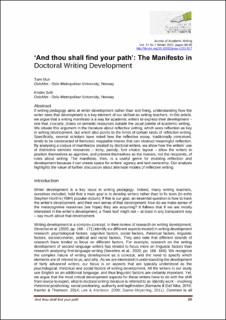| dc.description.abstract | If writing pedagogy aims at writer development rather than text fixing, understanding how the writer sees that development is a key element of our skillset as writing teachers. In this article, we argue that a writing manifesto is a way for academic writers to express their development – one that, crucially, draws on semiotic resources outside the usual palette of academic writing. We situate this argument in the literature about reflective writing, which sees reflection as key in writing development, but which also points to the limits of certain kinds of reflective writing. Specifically, several scholars have noted how the reflective essay, traditionally conceived, tends to be constructed of formulaic mappable moves that can obstruct meaningful reflection. By analysing a corpus of manifestos created by doctoral writers, we show how the writers’ use of distinctive semiotic resources – irony, parody, font choice, layout – allow the writers to position themselves as agentive, and present themselves as the makers, not the recipients, of rules about writing. The manifesto, then, is a useful genre for enabling reflection and development because it can create space for writers’ agency and text ownership. Our analysis highlights the value of further discussion about alternate modes of reflective writing. | en_US |
